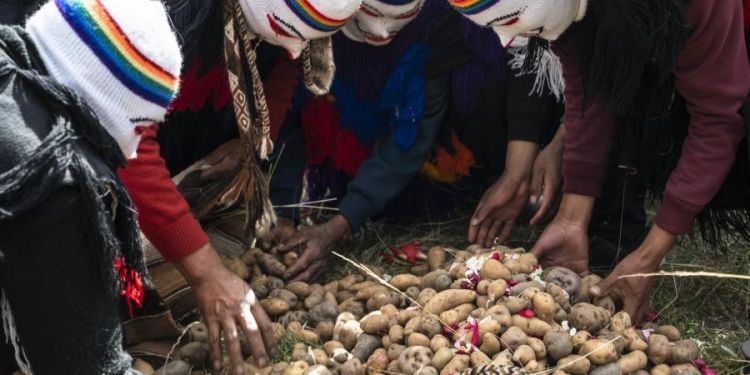Exploring Indigenous bioculture in Peru

Researcher Sarah Oakes writes about her interdisciplinary, participatory research investigating sociocultural potato knowledge among Quechua farmers in the Peruvian Andes.
The potato is the world’s third most consumed staple crop; global food security depends on its survival amid climate chaos.
While the urgent need for adaptation drives international scientists towards reductive approaches prioritising genetics and efficient production at scale, high in the Peruvian Andes, four Quechua farming communities are taking a different approach.
Having formed the Potato Park (Parque de la Papa) some 25 years ago, the mission of these potato guardians is to preserve biocultural diversity for future generations in a way that aligns with their centuries-old relationship with Pachamama.
This diversity is critical; it enables adaptation and strengthens the potato family against diseases and pest infections that increase with rising temperatures.
The Park now acts as both a biocultural heritage conservation area and living library of potatoes, as well as hosting a community seed bank and knowledge exchanges with international scientists and Indigenous communities, supporting local to international actors in collective missions towards food sovereignty and climate change adaptation.
Climatic changes are not the only threat; socioeconomic changes see younger people leaving agriculture for tourism-related jobs in Cusco and their desk-based education settings now result in limited opportunities for intergenerational knowledge transmission, risking the loss of sociocultural potato knowledge and practices in future generations.
Language barriers also hinder the sharing of the knowledge that underpins these communities’ biocultural heritage; while younger generations are schooled bilingually in Quechua and Spanish, older generations tend to speak only their native Quechua, particularly women whose education stopped at primary level.
My research uses participatory video to capture the knowledge and perspectives of community members of all ages and genders.
This will enable a wider range of voices to be heard so the communities can continue sharing their knowledge locally, nationally and internationally in support of Indigenous rights, climate change adaptation, food sovereignty and security.
Community members will define the specific themes for outputs themselves to ensure their usefulness for current and future generations.
Outputs hosted on the Roots project website and through audiovisual exhibitions will target a broad spectrum of actors, from tourism and scientific visitors to global Indigenous communities, academic and policy actors.
Academically, I aim to critically engage with and consider potential synergies between Indigenous epistemologies and Eurocentric science in an interdisciplinary way, with learnings for those working around climate change, food security, Indigenous knowledge and cultural extinction.
More information
- Top image: Community members celebrating potato diversity through Papa Watay, the tying of the potato spirit ceremony. Photograph: Phuyu Wayra © Roots Peru
- Sarah Oakes is on the Leverhulme-funded Doctoral Training Programme in Extinction Studies
- Visit Sarah Oakes’ researcher profile.





